Text
Citizen Cooks in the Age of Napoleon
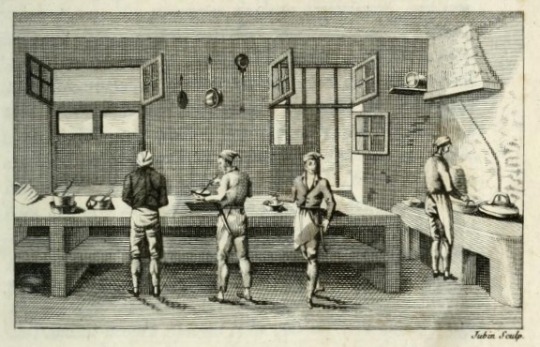
Excerpt about the role of cooks in France after the abolition of culinary guilds, and how they navigated a world which demanded for them to find new ways to stay relevant and prosperous. From Defining Culinary Authority: The Transformation of Cooking in France, 1650-1830 by Jennifer J. Davis:
French cooks sought new sites upon which to rebuild the authority of culinary labor. Throughout the early nineteenth century cooks increasingly adopted scientific terms to demonstrate their reliability and profound knowledge of the culinary arts. Such language communicated the author's education and distinction, just as an appeal to an elite patron had done in the 1660s and referral to a cook's professional expertise had done in the 1760s. The rhetoric and institutions of scientific knowledge also provided a means of distinguishing men's work from women's in the post-revolutionary era. During the early nineteenth century, cooks' claims to scientifically valuable savoir-faire rested on three crucial points of culinary innovation: food preservation, the improved production of bouillon, and gelatin extraction.
As these processes left the realm of traditional knowledge and became sites of scientific inquiry by tradespeople and amateurs alike, cooks sought to maintain authority in this arena by including scientific terms and theories in cookbooks, advertisements, and government petitions.
Two factors encouraged cooks' claims to scientific knowledge during this era. First, when Napoleon Bonaparte took the reins of government as first consul in 1799 and established himself as emperor in 1804, he raised medical doctors and academic scientists, Idéologues, to positions of political prominence. From these posts, the Idéologues subsidized experiments and inventions deemed useful to the nation and encouraged the popularization of science in the public sphere through state sponsorship of exhibitions and print forums. The Idéologues particularly supported research related to food preparation and preservation that might benefit France's armies and navies, with obvious benefits for professional cooks. Many cooks presented their particular techniques to the government during this time, seeking both financial recompense and public acclaim. Second, a voluntary association closely allied with the Idéologues' vision, the Société d'encouragement pour l'industrie nationale (Society for the Encouragement of National Industry), provided a forum in which formally trained scientists, politicians, merchants, artisans, and curious educated men might unite to address questions that inhibited French science and industry.
Together, these men sought to develop a more coherent program for industrial advancement than any one group could achieve independently. The society explicitly sought to join scientific knowledge to artisanal practical expertise, recognizing that each group had strengths that would benefit industrial development. This association invested heavily in three diffuse projects that eventually infused the most basic culinary processes with scientific awareness: new methods of food preservation to benefit the nation's armies and navies, new methods of stock preparation to sustain the nation's poor, and new methods of extracting gelatin from bones to improve hospital and military diets at little added expense.
#Illustration from L'art du Cuisinier by Antoine Beauvilliers (1814)#Defining Culinary Authority: The Transformation of Cooking in France 1650-1830#Jennifer J. Davis#David#citizen cooks#napoleon#napoleon bonaparte#napoleonic#napoleonic era#first french empire#french empire#19th century#french revolution#cooks#food#culinary history#france#1800s#history#french history#Antoine Beauvilliers#Beauvilliers#Society for the Encouragement of National Industry#Société d'encouragement pour l'industrie nationale
22 notes
·
View notes
Text
Father of the Grenadiers
For the first few years of the Empire, Oudinot was commanding grenadier divisions. His willingness to fight among the ranks and his general popularity in the army won him the everlasting affections of his men.
François Pils, Oudinot's aide/valet* from 1804 - 1814, mentions this in his military diary:
It was at the battle of Wertingen that the general first led his grenadiers to glory. Since then, they no longer called him their general, but they all called him Father.
The Battle of Wertingen was the first battle of the campaign of Ulm so it was around October 1805. It was also around this time that Napoleon would nickname this particular elite grenadier division Oudinot's Grenadiers, a name that would always accompany Oudinot whenever he would command grenadier divisions.
And this whole 'father' thing also stuck, even when Oudinot would switch between grenadier divisions like in 1807 during the siege of Danzig when he was commanding a joint division of grenadiers and voltigeurs:
Not a day went by without fighting; either the French attacked, or they were warned by the Russians on the 19th in the morning the enemy made a new effort and rushed en masse from the Pharwassen into our lines. Warned by the sound of cannon fire, the general arrived at a gallop and, just as he was leading a column of grenadiers after him, a cannonball took the head of his horse; the animal rolled to the ground, dragging its rider with it, amidst a clamour of despair that came from all the chests: the grenadiers believed that their general had just been killed! But this movement of anxiety did not last long: the general got up at once and mounted a new horse which I presented to him. Then, from all sides, enthusiastic cries were heard: "Long live General Oudinot! Long live our father!"...
Wow...besides Napoleon, I don't think I've ever read of such a display for any other general/marshal. They really did love him.
Pils, F., & Cisternes, R. de. (1895). Journal de Marche du Grenadier Pils: (1804-1814). Ollendorff.
*Pils was not Oudinot's ADC, he was never conferred that position. It's been hard to find out what exactly was Pils' role as part of Oudinot's staff since he was just a private soldier who Oudinot just took under his wing.
Original French:
C'est au combat de Wertingen que le général conduisit pour la première fois ses grenadiers à la gloire. Depuis, ils ne l'appelèrent plus leur général, mais tous lui laissèrent le surnom de Père.
Il ne se passait plus de jour sans combat; soit que les Français attaquassent, soit qu'ils fussent prévenus par les Russes le 19 dès le matin l'ennemi fit un nouvel effort et s'élança en masse du Pharwassen dans nos lignes. Averti par le bruit du canon, le général arrive au galop et, à l'instant où il entraînait une colonne de grenadiers à sa suite, un boulet emporte la tête de son cheval; l'animal roule à terre entraînant son cavalier , au milieu d'une clameur de désespoir qui sort de toutes les poitrines: les grenadiers croient que leur général vient d'être tué!…Mais ce mouvement d'inquiétude ne fut pas de longue durée: le général se relève aussitôt et enfourche un nouveau cheval que je lui présente. Alors, de toutes parts, des cris enthousiastes se font entendre: «Vive le général Oudinot! Vive notre père!»...
16 notes
·
View notes
Text
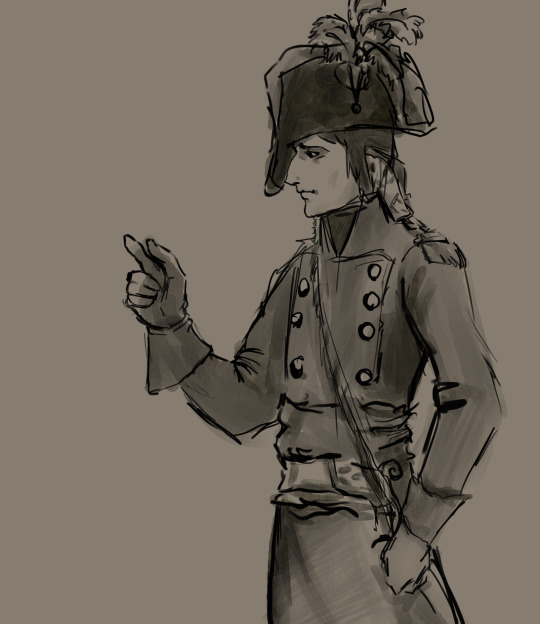
Hi whatslur fans welcome back to my youtube channel!!
43 notes
·
View notes
Text

Robe sword and scabbard 1802-03
In 1799 a new system of government, led by three Consuls, was introduced in France. Napoleon was elected First Consul. A sword of this pattern was provided to each of them, although this one is of a later date and must have been a replacement for the original. It was acquired by George IV with a certificate swearing that it had belonged to Napoleon himself.
222 notes
·
View notes
Text
Napoleon and Nicolas Appert: The invention of canned food
“Although he [Napoleon] continued so far as possible the Revolutionary practice of having armies live off the land, he also did his best to develop an efficient commissariat. A famous part of his supply system was canned food, particularly meat, for the army. Nicholas Appert had started the food-canning industry in 1804, building a factory that employed fifty people. His method prescribed putting the food in glass jars, which were next carefully stoppered, and then cooked in boiling water for lengths of time varying with the type of food. The navy first used the canned food, with great success even on extended cruises. In 1810 the Minister of the Interior awarded Appert 12,000 francs on condition he make his process public.”
— Robert B. Holtman, The Napoleonic Revolution
The inventor of canning, Appert, deposited samples of his invention to the imperial government in 1809, specifically to the Society for the Encouragement of National Industry [Société d'Encouragement pour l'Industrie Nationale].
He published his findings in 1810, titled: Le livre de tous les ménages ou l'art de conserver pendant plusieurs années toutes les substances animales et végétales [English tr: The Art of Preserving All Kinds of Animal and Vegetable Substances For Several Years]. It was “a work published by the order of the French Minister of the Interior, on the report of the Board of Arts and Manufactures”.
For his discovery, the government paid him 12,000 francs and gave him free lodgings and a workshop in the Hospice des Quinze-Vingts. Every prefecture in the French Empire was supplied with a copy of his book, and the prefects were assigned the responsibility of disseminating the information widely. Two more editions were created under the empire, and another in 1831.
His factories were ransacked and destroyed during the invasions of France in 1814 and again in 1815. He was able to rebuild and won several gold medals from the Society for the Encouragement of National Industry and eventually became a member of the Society.
Appert is quoted as saying “I sacrificed everything for humanity, all my life”.
Additional Sources:
English translation of Appert’s 1810 publication
Nicolas Appert inventeur et humaniste, Jean-Paul Barbier, 1994 (Fondation Napoléon)
Collection A. Carême: Le conservateur 1842 (archive.org)
Defining Culinary Authority: The Transformation of Cooking in France, 1650-1830 by Jennifer J. Davis
#he’s my hero 😭#Nicolas Appert#Appert#Napoleon#napoleon bonaparte#canned food#Robert B. Holtman#Holtman#the Napoleonic revolution#napoleonic era#napoleonic#canned#canning#first french empire#french empire#19th century#history#Jean-Paul Barbier#Barbier#culinary history#french history#napoleonic wars#coalition wars#1800s#food#food history#gastronomy#Napoleonic reforms#reforms#Napoleon’s reforms
14 notes
·
View notes
Text

Yup, again ACU Napoleon sketch :")
#so beautiful#Napoleon#art#artists on tumblr#tumblr art#napoleon bonaparte#ac unity#assassin's creed unity
52 notes
·
View notes
Text
Reblog for bigger sample size etc
#I was torn between 3 options but I decided that I would write a banger memoir#out of loyalty to my emperor of course ;)
30 notes
·
View notes
Text
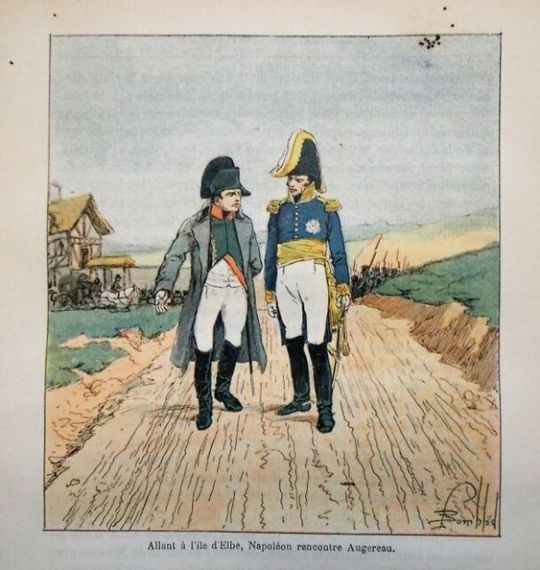
Napoleon, on the way to the ship to Elba, randomly encountered Marshal Augereau. They had an argument where each accused the other of fucking up and/or being a traitor. I think Augereau still tried to return to Naps during the 100 days but Naps said forget it.
37 notes
·
View notes
Text
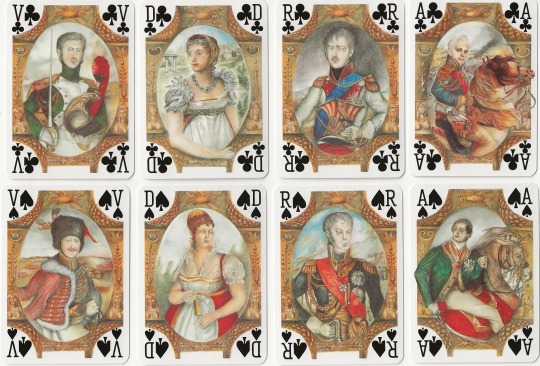

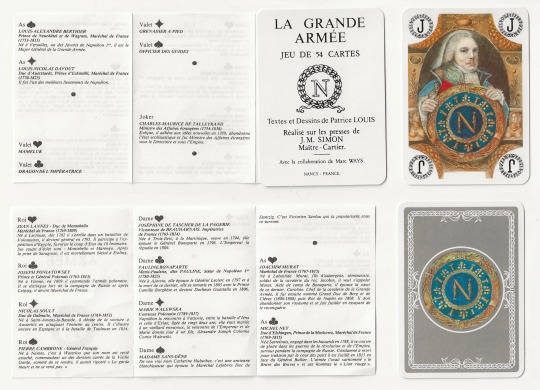
French Grande Armee Playing Cards with art and text by Patrice Louis
[Open images for better quality/readable text]
♣️ Dragon de l’ Impatrice, Pauline Bonaparte, Marshal Poniatowski, Marshal Ney
♠️ Officer Des Guides, Madame Lefebvre, General Cambrone, Marshal Berthier
♥️ Mamluk, Josephine, Marshal Lannes, Marshal Murat
♦️ Grenadier a Pied, Marie Walewska, Marshal Soult, Marshal Davout
I can’t find any other information about the artist except that he’s also illustrated other historical cards sets in the 1970s. I like how it’s a Grande Armee set with no Napoleon, and the people within the suits seem to have no particular connection to one another. It’s like the guy who made these was just choosing people that he liked.
10 notes
·
View notes
Text
Okay Hudson Lowe could be a bit of a dickmuffin sometimes but you know what?
Napoleon also could have a little bit of a type-A personality, sometimes, okay, he could be a tad difficult! He’s not exactly made of sunshine and roses and shooting rainbows out of his ass
80 notes
·
View notes
Text
“As a poet, do you have a great and keen sense of the historic?”
“I am not a historian, but I find myself being more and more fascinated by history and now I find myself reading more and more about history. I am very interested in Napoleon, at the present: I’m very interested in battles, in wars, in Gallipoli, the First World War and so on, and I think that as I age I am becoming more and more historical.”
— Sylvia Plath
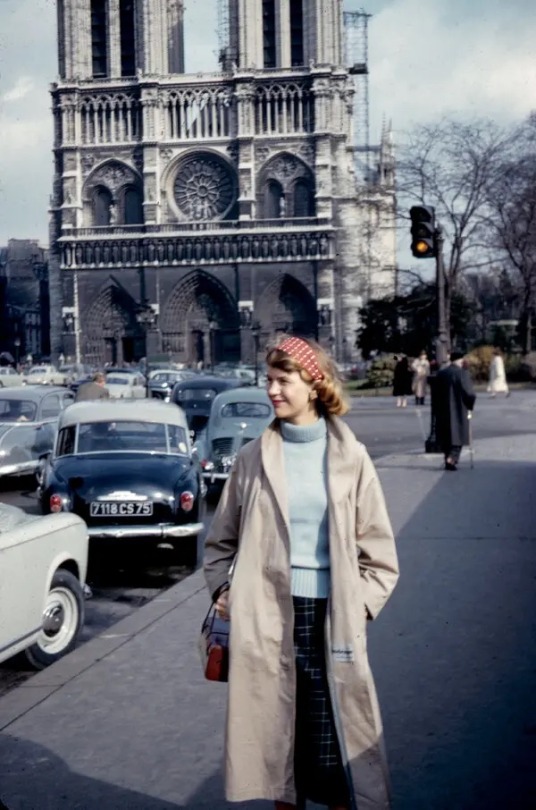
(Modern American Poetry)
#are you actually poetical if you aren’t completely fascinated by Napoleon? probably not.#Sylvia Plath#napoleon bonaparte#napoleon
14 notes
·
View notes
Text

Napoleon by Hirohiko Araki for Vol. 10 of Educational Manga: World History
90 notes
·
View notes
Text
MARIE-THÉRÈSE FIGUEUR // SOLDIER
“She was a French soldier who fought in the French Revolutionary Wars and Napoleonic Wars. Unlike some female soldiers before the twentieth century, she did not disguise her gender when she enlisted, serving for twenty-two years under her own name in the French Revolutionary Army and the Grande Armée.”
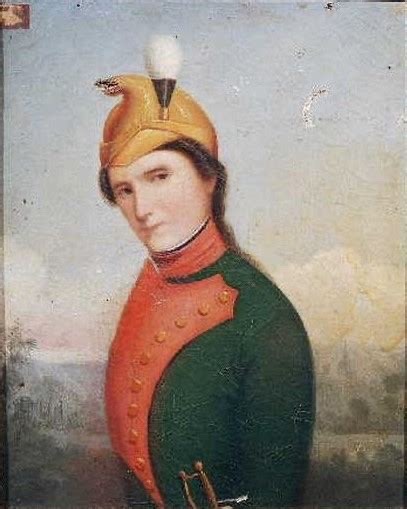
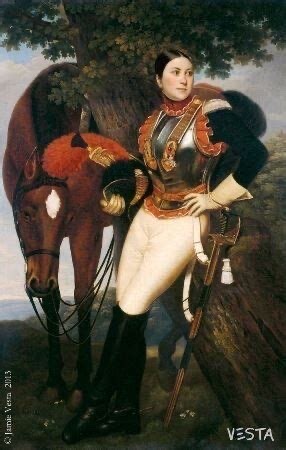
82 notes
·
View notes
Text
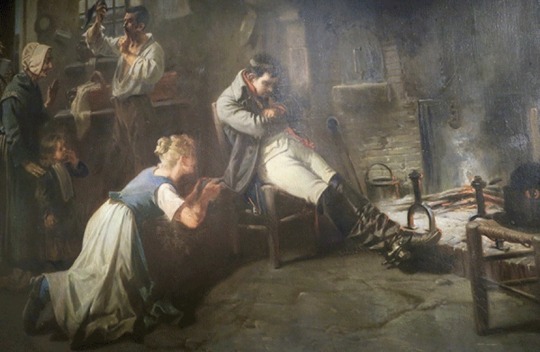
Another day goes by, another sulking Napoleon pic
Or he might be sleeping. Idk
Chez la Vieille, Charles Édouard Armand-Dumaresq
Location: Musée Napoléon at Brienne-le-Château
#Charles Édouard Armand-Dumaresq#Armand-Dumaresq#napoleon#napoleonic era#napoleonic#napoleon bonaparte#art#paintings#first french empire#french empire#19th century#history#Charles Edouard Armand-Dumaresq#musée napoléon#brienne
76 notes
·
View notes
Text
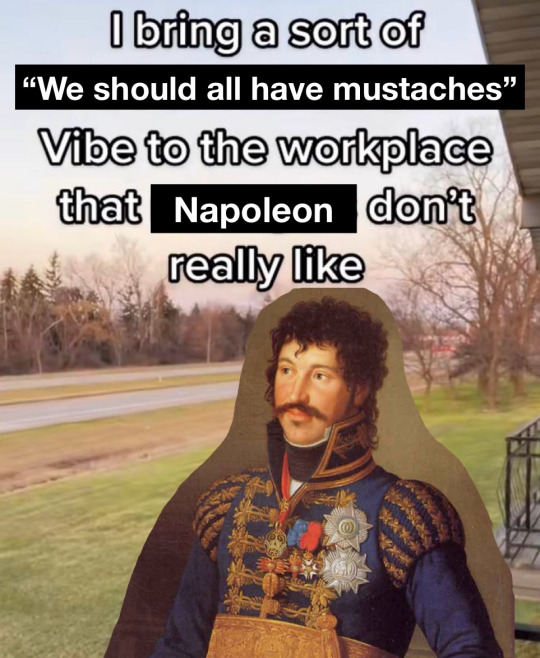
Murat meme;;;;;
Inspired by this post
#Murat posting#my memes#memes#napoleonic era#Joachim Murat#Murat#napoleonic#napoleon bonaparte#napoleon#history memes#french empire#France#France memes#mustache#mustaches#history
33 notes
·
View notes
Photo
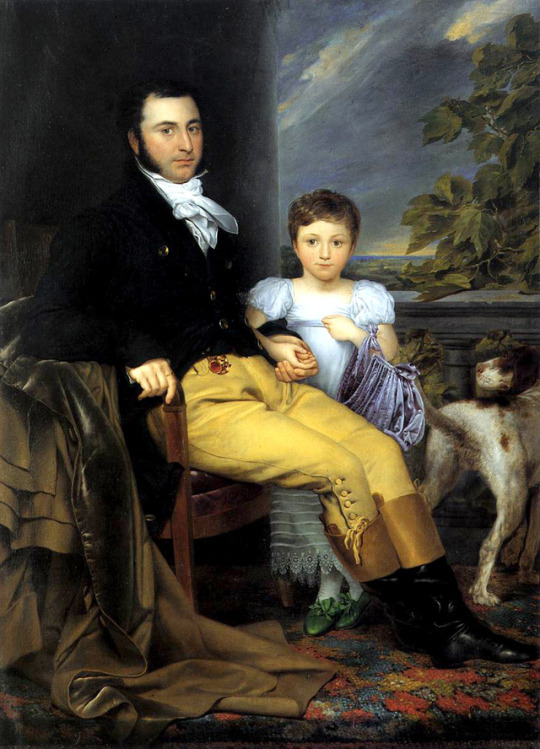
1814 Joseph Denis Odevaere - Portrait of a Gentleman with his Daughter and Hunting Dog
(Groeninge Museum)
95 notes
·
View notes